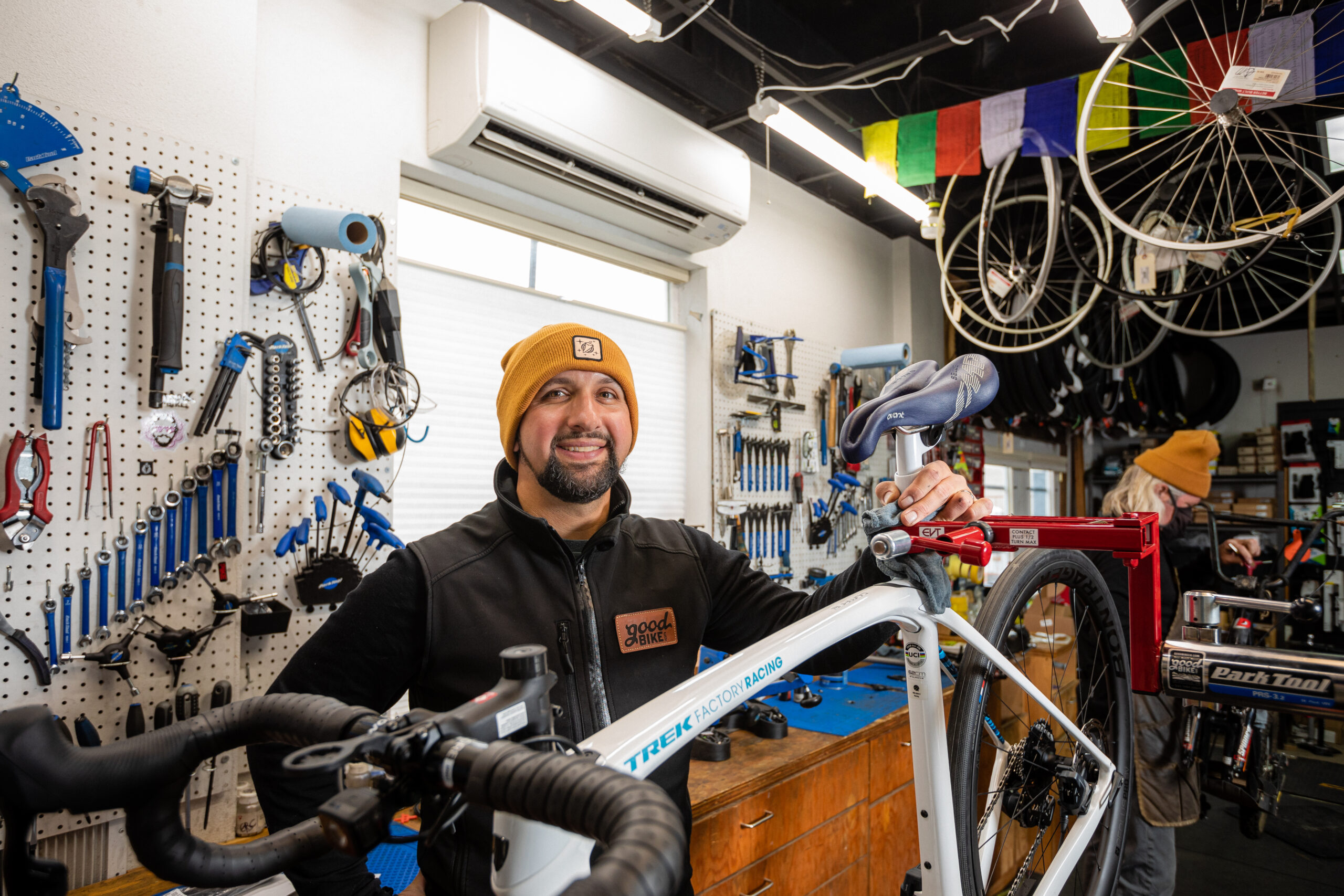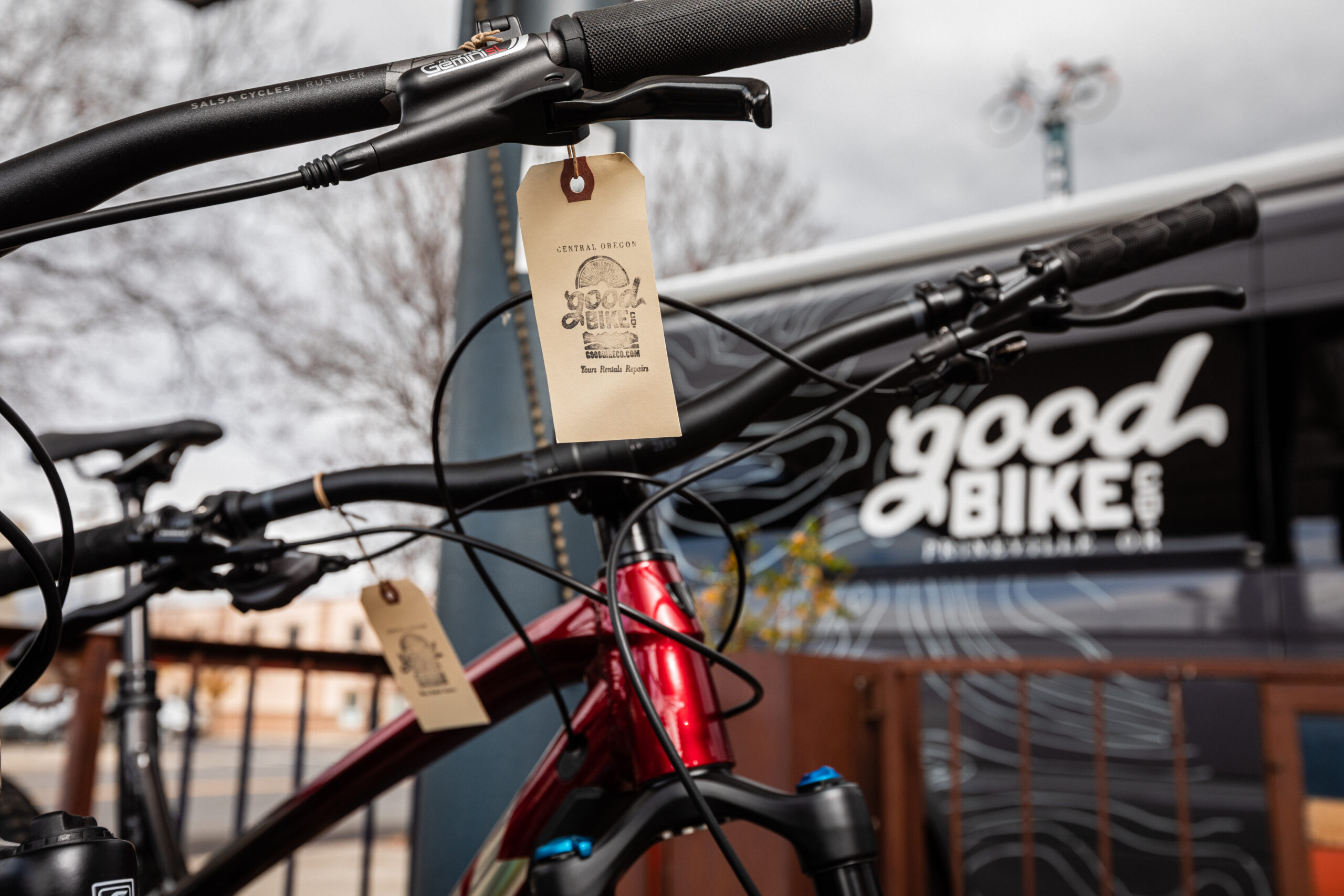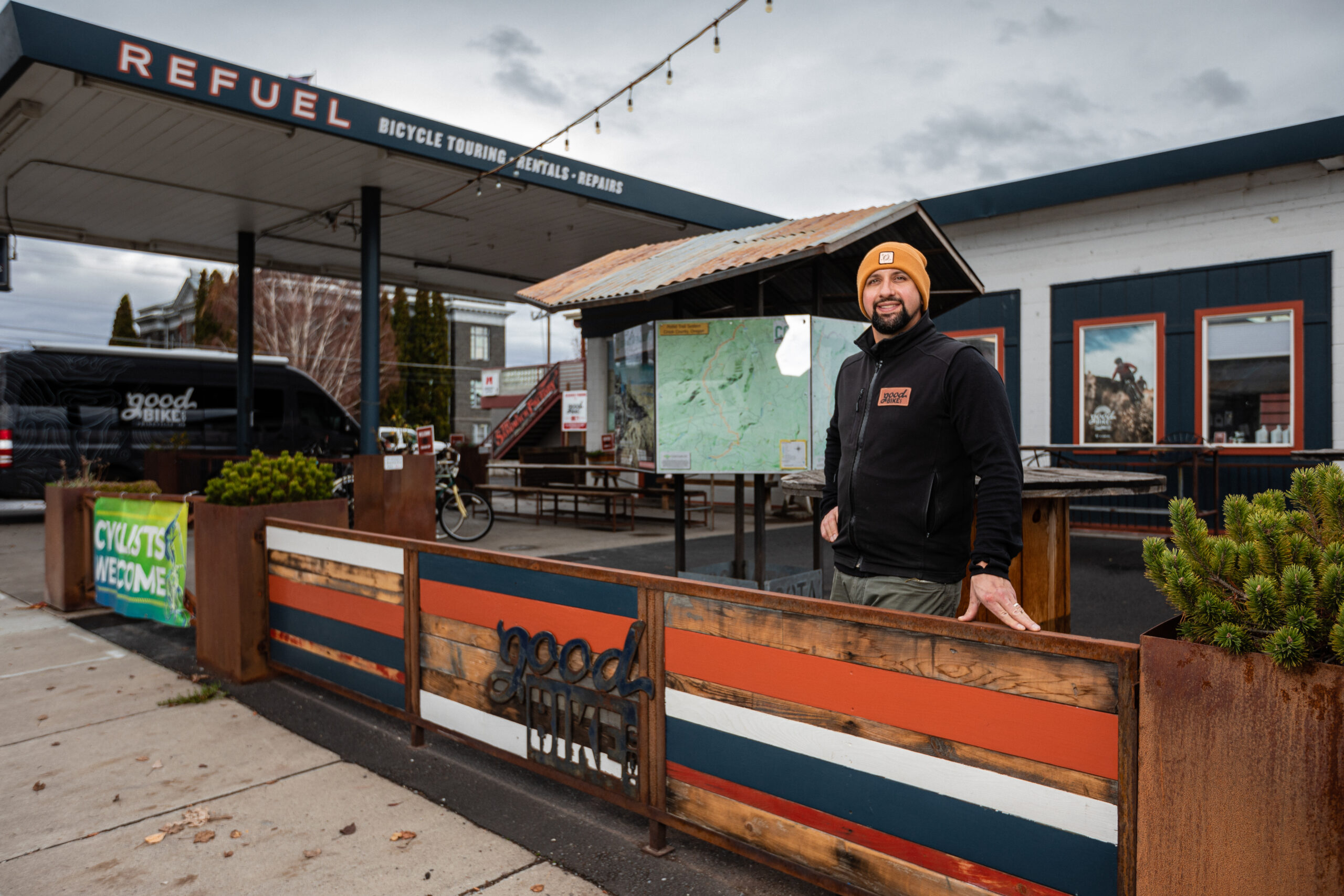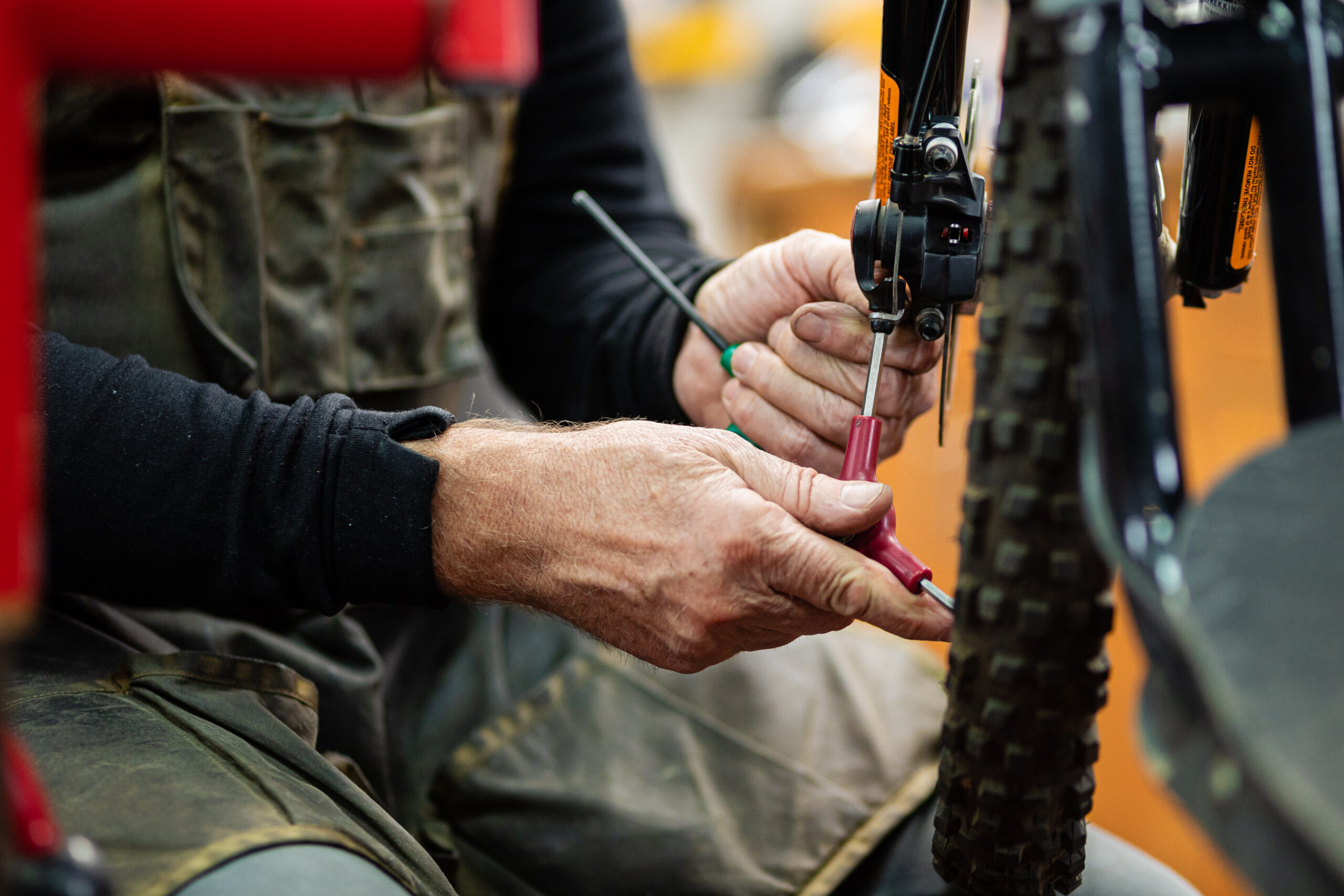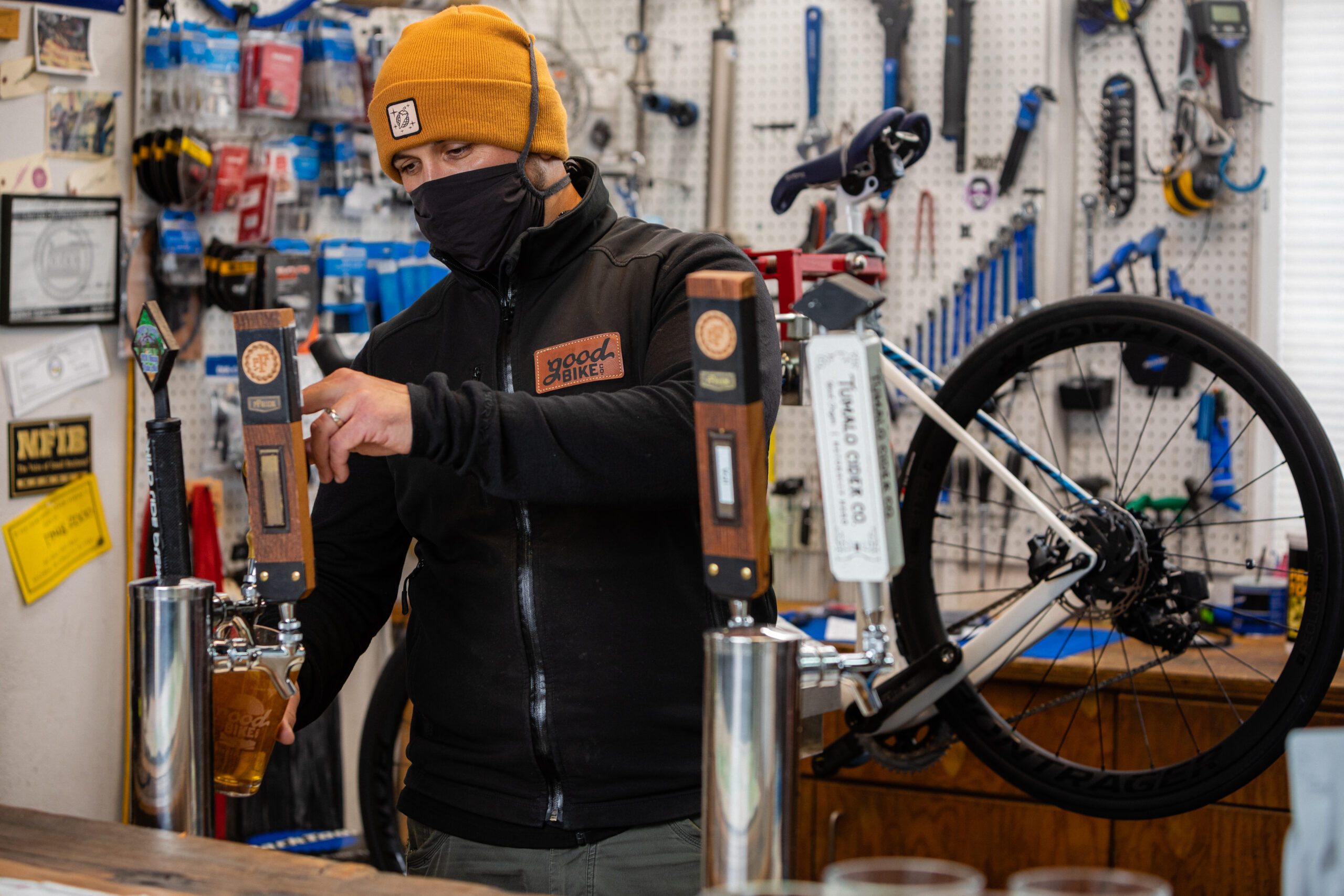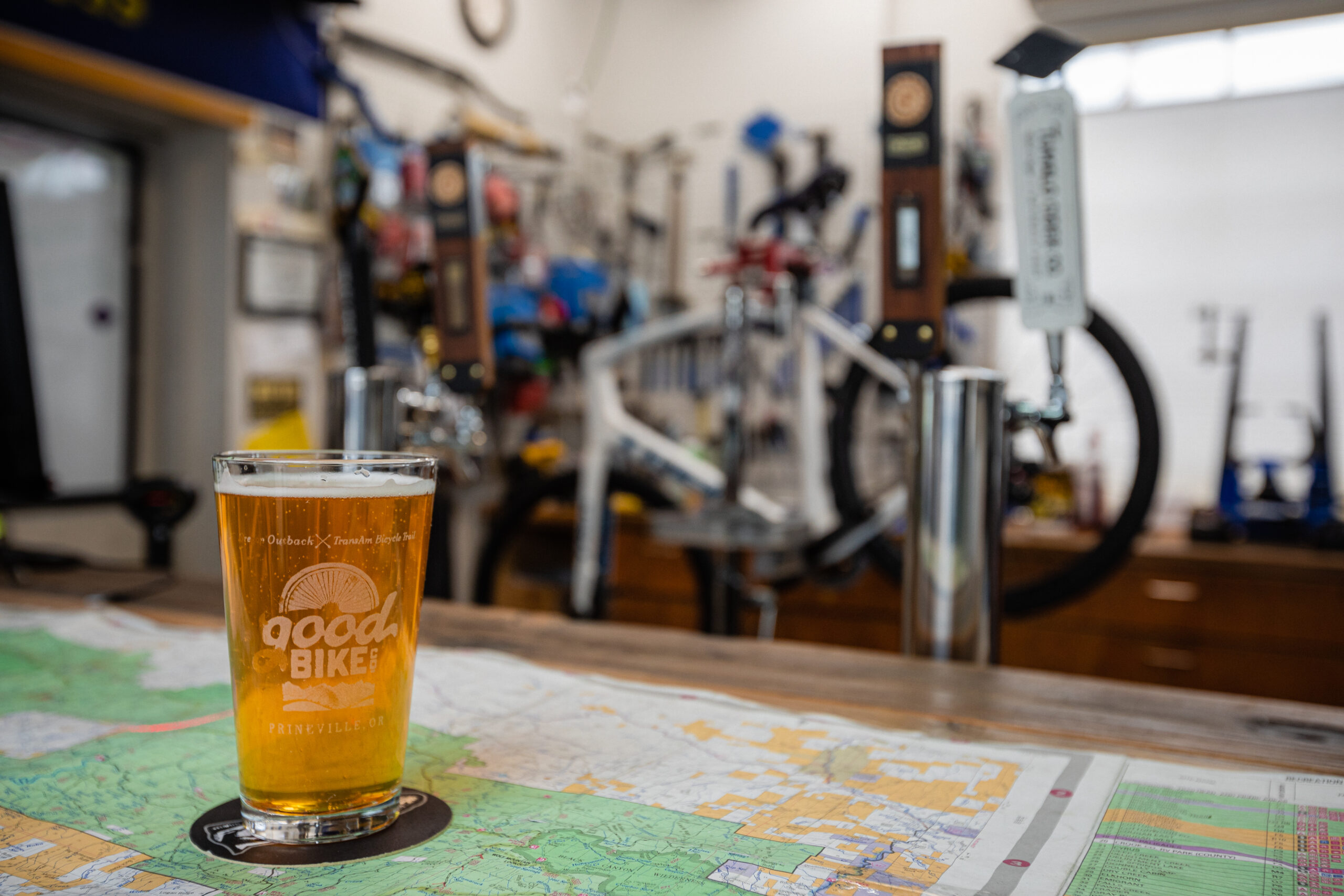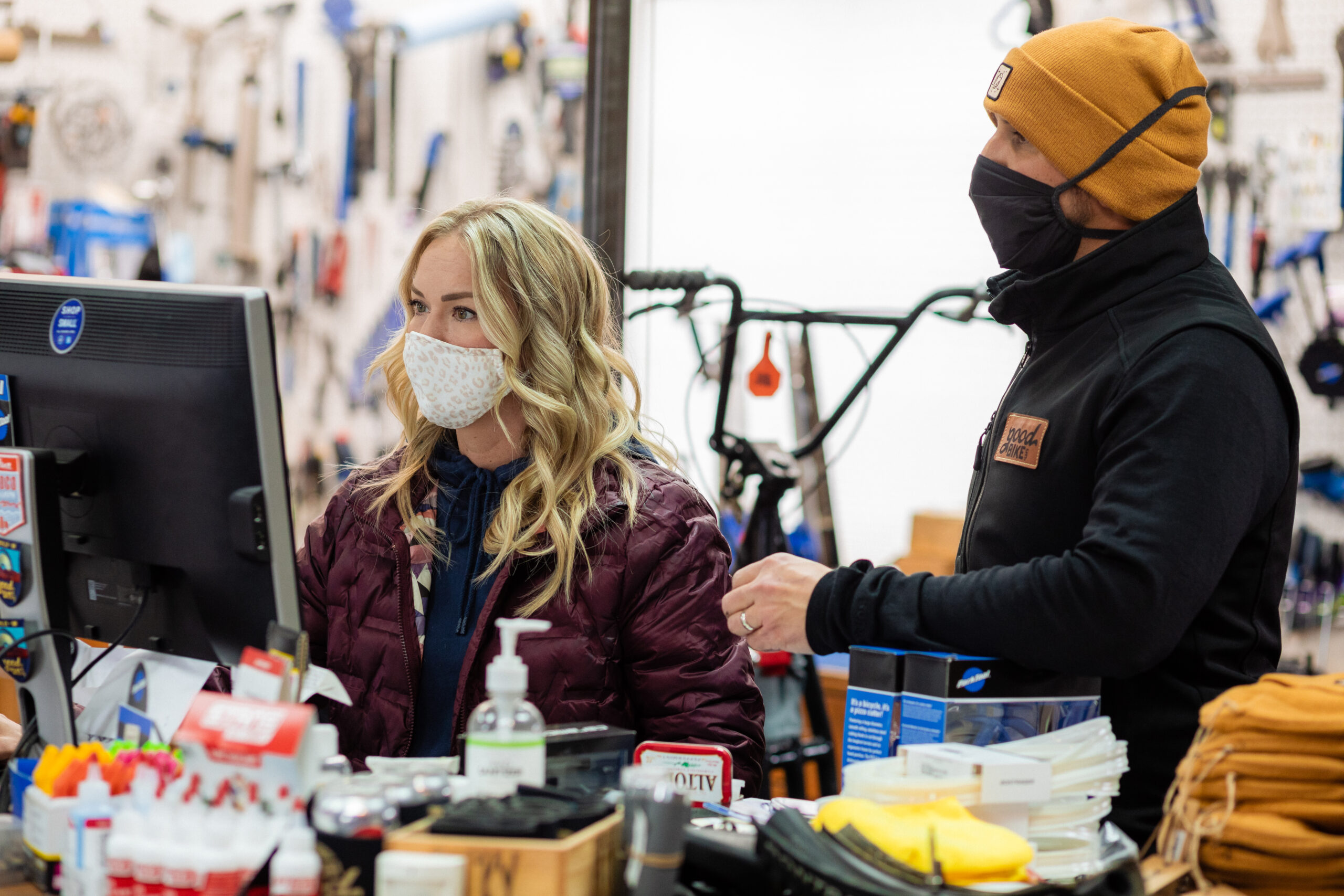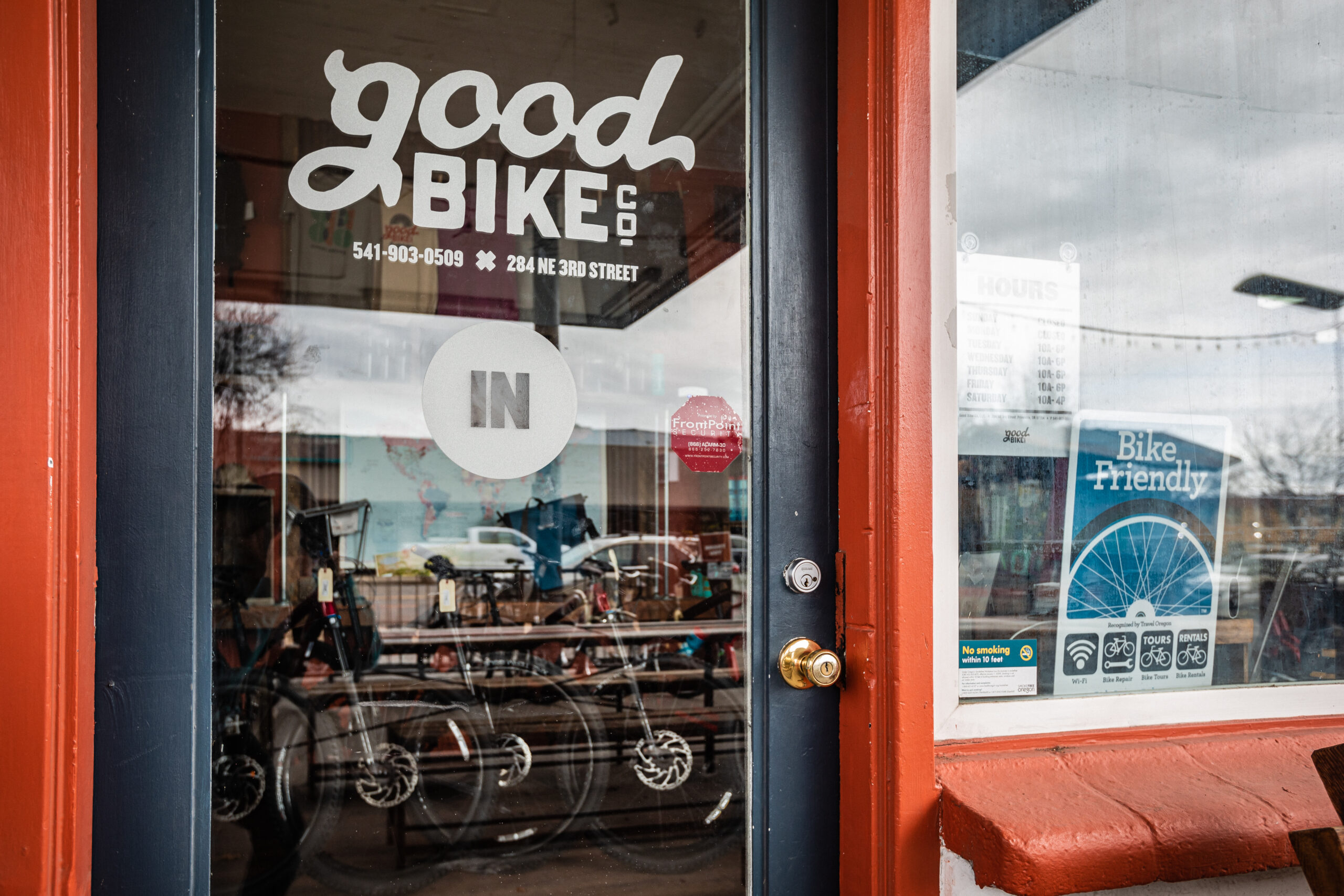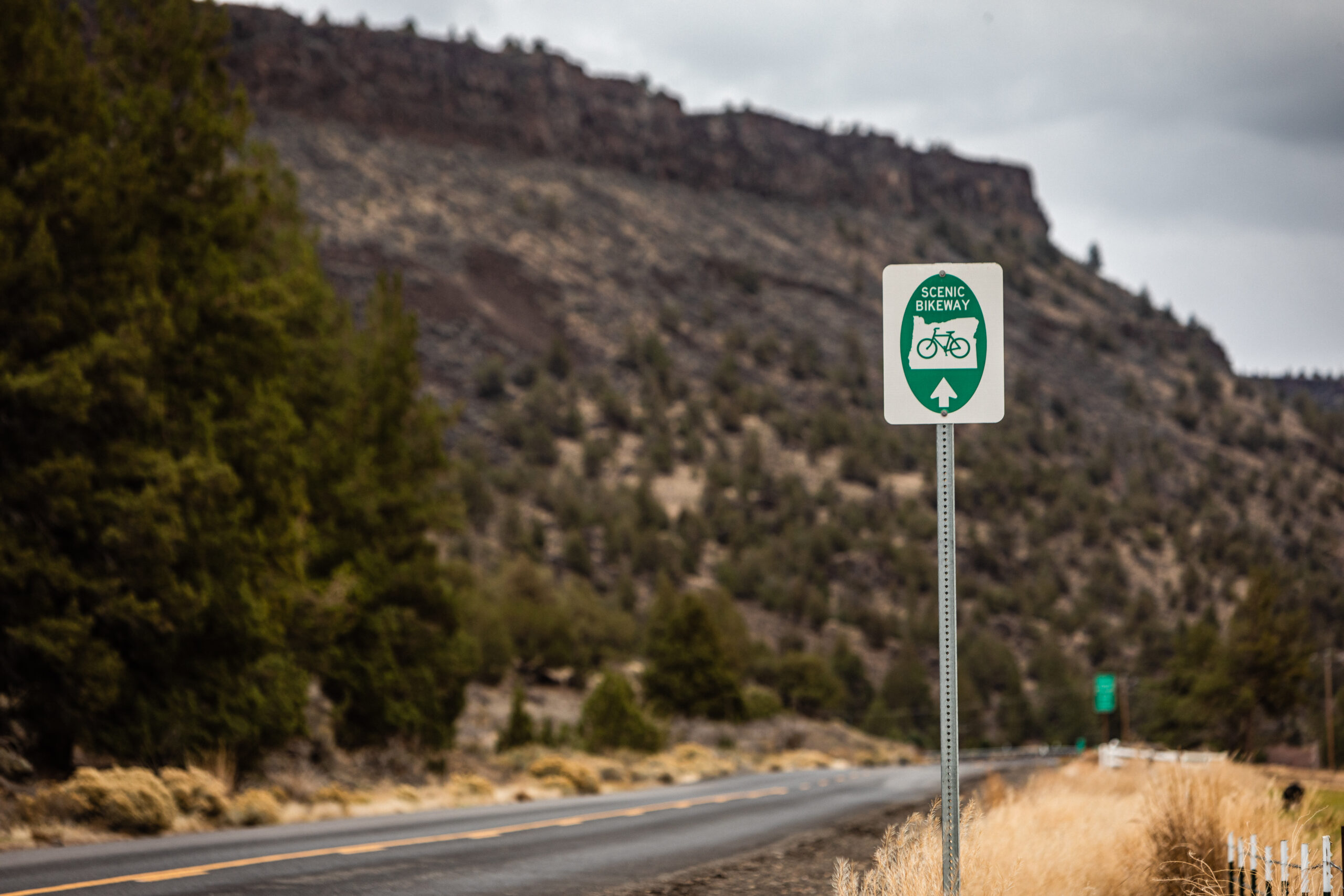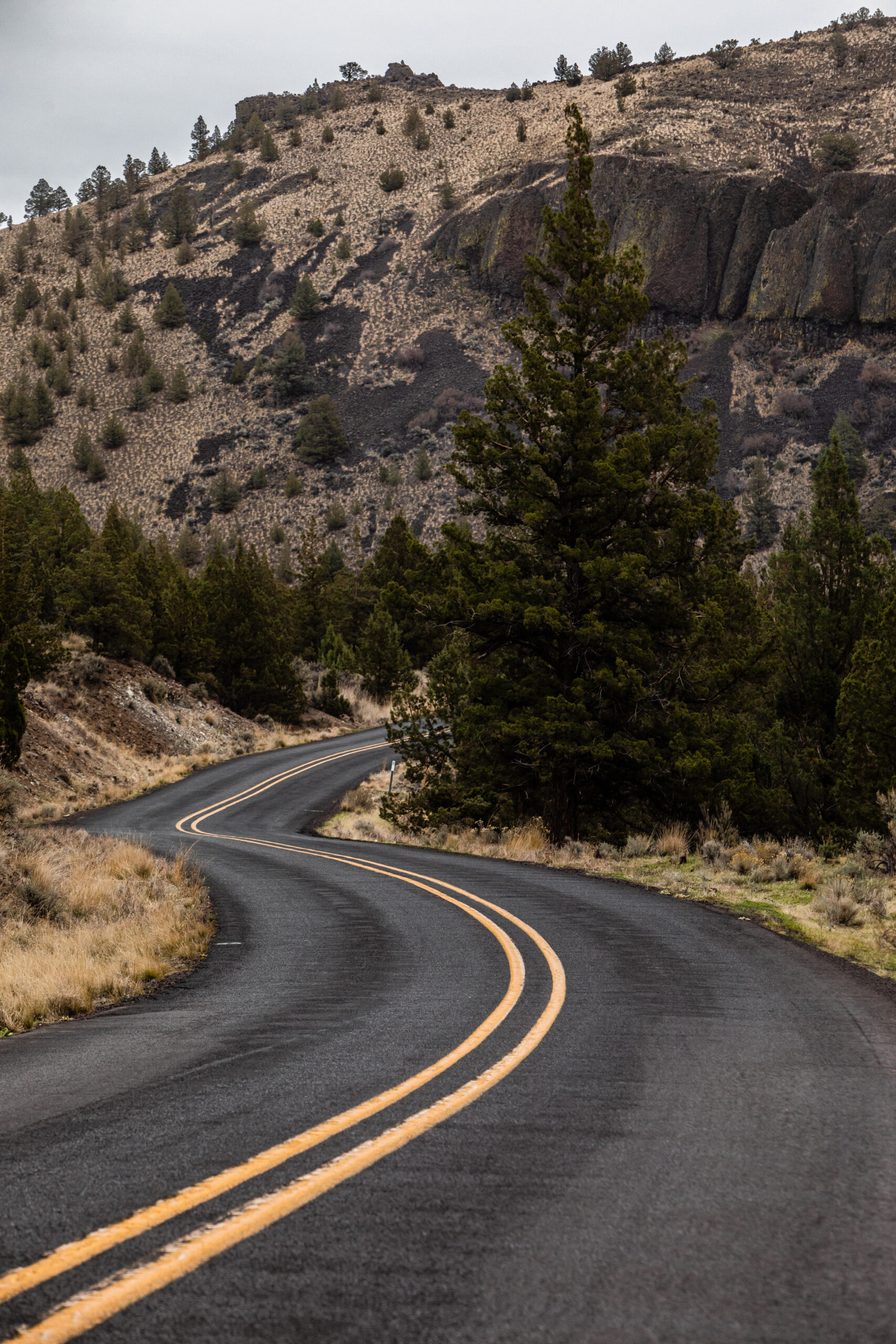After installing an energy-efficient heat pump, Good Bike Co.’s owner said he wished he’d done it years ago. “The cost savings in utilities are just astronomical. It opens up opportunities for us to continue to grow, where before we were throwing out hundreds of bucks every month for heat and not even being warm or comfortable.”
In the first years of his business, James Good was more focused on getting his customers outdoors on a bike they loved than he was on how they felt when they were inside his shop.
When he opened Good Bike Co. in 2014, he and his brother spent two weeks remodeling the storefront, a 1940s gas station in downtown Prineville. They had help from family, friends and professionals for electrical and plumbing. But it was largely a Good brothers production. They tore down walls, built cabinets and transformed the space to include retail and repair areas, plus a bar up front for customers to socialize over a pint from their rotating taps of local beer.
Working on a tight budget, they didn’t pay much attention to the heating system. Looking back, Good said he wishes he had done it differently.
In the winter they’d plug in space heaters to warm the 1,000-square-foot shop, which sent the electric bill as high as $400 a month. In summer, electric fans and open windows weren’t enough to counteract 90-degree temperatures.
It was uncomfortable, and Good was concerned for his employees. “I’m lucky that they put up with the working conditions, really.”
That changed about 10 months ago, when the bike shop installed an energy-efficient ductless heat pump. Acting on advice from a friend, Good got a $750 cash incentive from Energy Trust of Oregon to help with the cost.
“In hindsight, I wish I would have installed it 7 years ago,” he said.
The new system cut his utility bills to about $75 a month, and the shop stays at a consistent temperature year ‘round.
“The cost savings in utilities are just astronomical,” Good said. “It opens up opportunities for us to continue to grow, where before we were throwing out hundreds of bucks every month for heat and not even being warm or comfortable.”
Working with Energy Trust to claim the incentive was easy, he added, and the benefits were immediate — no more worries about pipes freezing in winter or staff sweltering in summer.
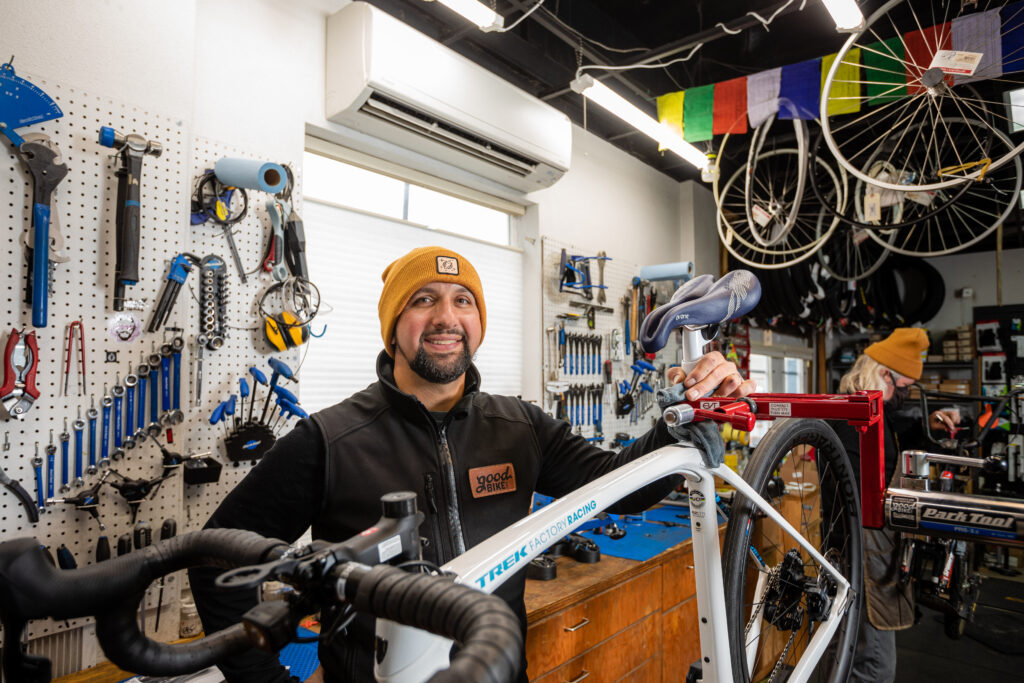
Owner James Good on the floor of Good Bike Co. The shop’s energy-efficient heating and cooling unit is on the wall behind him.
Good’s advice to other small business owners who are weighing the up-front costs of an upgrade against a slim budget: “Do it yesterday. I would not hesitate one bit. Especially with the incentives.”
With the peace of mind his new heating system brings, Good can get back to focusing on what he loves. As a certified outdoors guide, he’s made it his mission to support cyclists who come through Prineville. The shop sits at a unique meeting point: the TransAmerica Bicycle Trail, the Oregon Outback Scenic Bikeway and the Central Oregon Backcountry Explorer Route all pass near its doors.
“Anybody going coast to coast will ride by the bike shop on Highway 26. We see cyclists from around the world, all summer long, stopping in,” Good said.
Visitors will grab a drink, sign the guest book and share stories about where they’ve been. Good’s staff also serve as informal guides to Prineville and the Ochoco National Forest.
“Cyclists love to spend money in the community — at grocery stores, restaurants, hotels, bike shops and all the other things,” Good said. “They also need help because they don’t know anybody. It’s great that we can be here for that, and also capture some of the tourism dollars that are coming through town.”
At the same time, Good and his team aren’t looking to push product for its own sake. His business decisions are increasingly guided by sustainability and an eye toward reducing waste.
That includes partnerships with bike manufacturers who reduce the packaging they use to ship their products and recycling everything they can in the shop. Sometimes, instead of selling a customer a new bike, Good will prioritize repairs to help extend the life of their current ride.
“Before pulling the trigger and getting whatever you need, we’re asking, ‘What is the impact? Is there something more sustainable or something better?” he said. “We’re thinking about that on a constant basis. In terms of environmental consciousness, it all adds up.”
Learn more about energy efficiency for your retail business with Energy Trust.
En los primeros años de su negocio, James Good estaba más enfocado en conseguir que sus clientes salieran a la calle con una de sus bicicletas, que en el hecho de que les gustara cómo se sentían cuando estaban dentro de su tienda.
Cuando abrió Good Bike Co. en 2014, él y su hermano pasaron dos semanas remodelando el local, una gasolinera de los años 40 en el centro de Prineville. Contaron con la ayuda de familiares, amigos y profesionales de la electricidad y la plomería. Pero fue en gran medida una producción de los hermanos Good. Derribaron paredes, construyeron gabinetes y transformaron el espacio para incluir zonas de venta y reparación, además de un bar en la parte delantera para que los clientes puedan socializar con una cerveza local de sus grifos rotativos.
Al trabajar con un presupuesto ajustado, no prestaron mucha atención al sistema de calefacción. Pensando en el pasado, Good dice que desearía haberlo hecho de otra manera.
En invierno enchufaban calentadores para la tienda de 1,000 pies cuadrados, lo que elevaba la factura de electricidad a $400 al mes. En verano, los ventiladores eléctricos y las ventanas abiertas no eran suficientes para contrarrestar las temperaturas de 90 grados.
Eso era incómodo, y Good estaba preocupado por sus empleados. “De verdad tengo suerte de que ellos soportaran esas condiciones de trabajo”.
Esto cambió hace 10 meses, cuando la tienda de bicicletas instaló una bomba de calor sin conductos de alta eficiencia energética. Siguiendo el consejo de un amigo, Good obtuvo un incentivo de $750 en efectivo de Energy Trust of Oregon para ayudar con el costo.
“En retrospectiva, me gustaría haberla instalado hace 7 años”, dijo Good.
El nuevo sistema redujo sus facturas de servicios públicos a unos $75 al mes, y la tienda mantiene una temperatura constante durante todo el año.
“El ahorro de costos en servicios públicos es astronómico”, dijo Good. “Nos abre oportunidades para seguir creciendo, cuando antes estábamos gastando cientos de dólares cada mes por la calefacción y ni siquiera estábamos calientes o cómodos”.
Trabajar con Energy Trust para solicitar el incentivo fue fácil, añadió, y los beneficios fueron inmediatos: ya no hay que preocuparse de que las tuberías se congelen en invierno o de que el personal pase calor en verano.

El propietario de Good Bike Co. Y La unidad de calefacción y refrigeración de bajo consumo a sus espaldas.
El consejo de Good a otros propietarios de pequeñas empresas que estén sopesando los costos iniciales de una actualización frente a un presupuesto escaso es: “Háganlo ayer. Yo no dudaría ni un instante. Especialmente con los incentivos”.
Con la tranquilidad que le proporciona su nuevo sistema de calefacción, Good puede volver a centrarse en lo que le gusta. Como guía certificado de actividades al aire libre, se ha propuesto apoyar a los ciclistas que pasan por Prineville. La tienda está ubicada en un punto de encuentro único: la TransAmerica Bicycle Trail, la Oregon Outback Scenic Bikeway y la Central Oregon Backcountry Explorer Route pasan cerca de sus puertas.
“Cualquiera que vaya de costa a costa pasará por la tienda de bicicletas de la autopista 26. Vemos a ciclistas de todo el mundo, a lo largo del verano, que se detienen en ella”, dijo Good.
Los visitantes van por una bebida, firman en el libro de visitas y comparten historias sobre los lugares en los que han estado. El personal de Good también sirve de guía informal de Prineville y del Bosque Nacional de Ochoco.
“A los ciclistas les encanta gastar dinero en la comunidad: en tiendas de comestibles, restaurantes, hoteles, tiendas de bicicletas y todo lo demás”, dijo Good. “También necesitan ayuda porque no conocen a nadie. Es estupendo que podamos estar aquí para eso, y también captar parte del dinero del turismo que pasa por la ciudad”.
Al mismo tiempo, Good y su equipo no buscan impulsar el producto por su beneficio individual. Sus decisiones empresariales se guían cada vez más por la sostenibilidad y la mirada puesta en la reducción de residuos.
Esto incluye asociaciones con fabricantes de bicicletas que reducen el embalaje utilizado para enviar sus productos y además reciclan todo lo que pueden en el taller. A veces, en lugar de vender a un cliente una nueva bicicleta, Good da prioridad a las reparaciones para ayudar a prolongar la vida útil de su bicicleta actual.
“Antes de apretar el gatillo y conseguir lo que se necesita, nos preguntamos: ‘¿Cuál es el impacto? ¿Hay algo más sostenible o algo mejor?”, dijo Good. “Pensamos en eso constantemente. En términos de conciencia medioambiental, todo suma”.
Obtenga más información sobre la eficiencia energética para su negocio minorista con Energy Trust.


